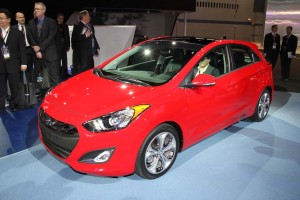This story has been updated to reflect new developments in Korea and comments by Hyundai officials in the U.S.
Hyundai Motor America is likely to lose market share in 2012 even as it takes aim at another all-time annual sales record. The problem, cautions CEO John Krafcik, is that the maker is reaching the limits of its global capacity, compounded by constraints at its plant in Alabama.
Potentially making the situation worse is the threat of a strike by 45,000 workers at Hyundai’s Korean operations — though on Friday those employees agreed to resume negotiations with the maker over a variety of demands.
“It would be difficult” for Hyundai especially in the U.S., if workers strike, Krafcik told TheDetroitBureau.com on Friday. So, “We certainly hope it gets resolved.”
So do investors who had been driving down Hyundai’s share price in recent days fearing the maker might be hit with its first walkout since 2008. Earlier this week, 70% of the members of the maker’s traditionally militant union voted in favor of staging a strike if demands aren’t met. Key on that list are reduced working hours and increased wages.
Workers at Kia, the smaller Korean carmaker controlled by Hyundai also approved a strike if demands aren’t met.
Hyundai already provides its workers the highest pay in the Korean auto industry, according to industry experts, something that has cut into the competitiveness of its products overseas – but also made it easier for the maker to justify building vehicles in places like the U.S. where, ironically, it operates without a union at a $1.4 billion assembly plant in Alabama.
South Korea has a history of labor confrontation that has often turned violent. As recently as the 1990s, riot-equipped police routinely were stationed around Seoul and other major cities in the country. The one-time corporate boardroom at former automaker Daewoo was ultimately rendered unusable because workers had been ousted by tear gas so often the noxious chemicals permeated the structure of the building, company officials revealed.
Hyundai estimates it lost production of more than 1 million vehicles – which it values at $10 billion – due to strikes between 1987 and 2008.
But the increases in pay and benefits it has approved for Korean workers in recent years has led to a period of unusual labor peace for Hyundai.
But other factors may be at play. A report by the Bloomberg News Service shows that there has been a 73% decline in the number of days Korean businesses, in general, have lost to strikes over the last decade – linking that to increased outsourcing of production, such as the shift by Hyundai to its Alabama assembly plant.
Reportedly adding to the tension that could lead to Hyundai’s first strike in four years is the presence of Moon Young Moon, now the head of the company’s largest union. The labor executive was a participant or organizer involved in a series of protests in the 1990s and Hyundai repeatedly tried to fire him, something that clearly influences the current level of confrontation. Moon was elected leader of the union last year after promising to be tough at the negotiating table.
He appears to be keeping to his word, demanding Hyundai end its rotating 12-hour shifts and adopt more traditional 8-hour workdays. Workers also want a nearly $200 increase in base wages – and are demanding that 30% of the very profitable company’s net income be earmarked as worker bonuses.
Hyundai, Bloomberg reported, is expected to post a second-quarter profit of around $2 billion.
The maker saw global sales during the first half of the year surge by 12%, to 2.2 million vehicles. In the U.S., the maker finished 2011 with all-time record sales and is on track to reach as much as 700,000 this year – without the disruption of a strike. That would be a roughly 8% increase, the maker forecasts – but would fall short of the anticipated rise in the overall U.S. market, said CEO Krafcik, because of limited capacity.

